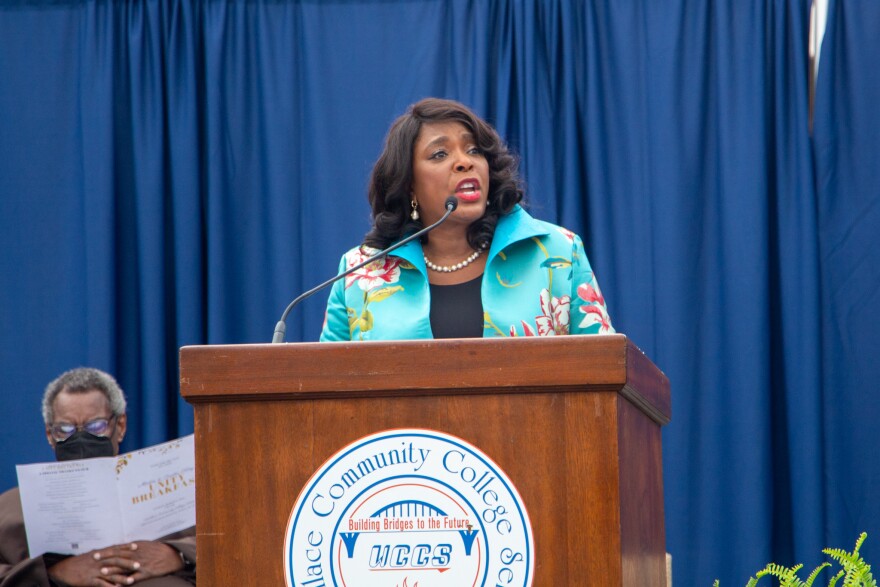This year’s Selma bridge crossing jubilee has come and gone. The annual event focuses mainly on two things. One is the attack on voting rights marchers in 1965 as they crossed the Edmund Pettus Bridge. The other is current condition of voting rights in the United States. Now, what comes next…
For an event that focuses on voting rights in the United States, Selma appears to be doing less of it. The Associated Press reports that only fifty seven percent of registered voters in Dallas County cast ballots in the 2020 Presidential election. Residents told the AP that apathy and a shrinking population are to blame for this slide in voting.
“It was a chilly Sunday morning, 57 years ago, when 600 brave individuals set out from Selma,” said Vice President Kamala Harris. “Bloody Sunday” was part of what brought Vice President Kamala Harris to Selma.

“They were marching for the most fundamental right of American citizenship: the right to vote,” said Harris. “Today, we stand on this bridge at a different time. We again, however, find ourselves caught in between. Between injustice and justice. Between disappointment and determination. Still in a fight for a ‘more perfect union.’ And nowhere is that more clear than the ongoing fight to secure the freedom to vote.”
Harris was joined by five members of the Biden cabinet, and members of Congress with the same message.
“Old battles have indeed become new again. But we know from your sacrifice, from your courage, that we must be ever vigilant,” said U.S. Representative Terri Sewell.

Representative Terri Sewell, who represents Selma in the US House, sponsored the John Lewis Voting Rights Act this year. The proposed bill would restore and strengthen parts of the Voting Rights Act of 1965.
“Every generation making sure that we hold onto the progress that we currently have and we fight to advance that progress in the future,” said Sewell.

Recent Supreme Court cases have ruled certain provisions of the act unconstitutional. The John Lewis Voting Rights Act passed in the House but was blocked by a Senate filibuster. A large focus of the Bridge Crossing Jubilee was the passage of the John Lewis Voting Rights Act.
“The Voting Rights Act of 1965 has been eviscerated by this Supreme Court,” said House Majority Whip Jim Clyburn also spoke in Selma. He criticized the Supreme Court but remained determined.
“But they must know that we will not give up, we will not give in, we will stand our ground until the end,” Clyburn said.
“In a moment of great uncertainty, those marchers pressed forward and they crossed. We must do the same,” said Vice President Harris, who echoed Sewell and Clyburn’s sentiments.
“We must lock our arms and march forward. We will not let obstacles stop us. We know that honoring the legacy of those who marched then demands that we continue to push Congress to pass federal voting rights legislation,” she said.
Harris also outlined why she believes voting rights are being limited today.
“A record number of people cast their ballots in the 2020 elections,” the Vice President observed. “It was a triumph of democracy in many ways. But not everyone saw it that way. Some saw it as a threat. And so, as powerful people have done many times in our nation’s history, they launched an assault on the freedom to vote.”

Vacant buildings lined the temporarily bustling streets of downtown. Selma’s population has decreased seventeen percent since 2010.
“We must stop dreaming and we must start building the beloved community. We must check our hearts and minds to see if we still believe in this prophetic dream,” said State Senator Malika Sanders-Fortier, who urged Bridge Crossing Jubilee attendees to invest in Selma for more than a day.
“Today, as I get ready to take my seat, call on people all throughout this nation. Come to Selma, lend your gifts and talents, send your resources. Here in Selma, we are building a model of the beloved community,” she contended.
Activists battled the heat and strong winds as they listened to leaders before the bridge crossing.
“Selma, the future of our democracy is being decided now,” said Vice President Harris. When she finally took the stage, they were ready to commemorate the day that changed civil rights history.
“Those who marched across this bridge, yes they marched for the freedom to vote. They also marched for all the rights and freedoms that voting unlocks. They marched for economic justice, for social justice, for racial justice. And we must do the same,” Harris told the crowds in Selma.
We started this story with data from the Associated Press on fewer voters casting ballots in Selma. That may not be the only thing supporters of voting rights have to worry about. The Southern Poverty Law Center just released its annual headcount of white supremacist, neo-nazi, and other hate groups in the U.S. That number is just over seven hundred in 2021. It was over nine hundred in 2019. That’s the good news. The SPLC also says extreme views in the nation are also becoming more mainstream among conservative voters. So, while Vice President Harris is expressing her views. Other people are express theirs.
Editor's note— Many thanks to the Selma Sun for their photography used in Libby Foster's feature. APR collaborates with the Sun on coverage in Alabama's Black Belt region.




